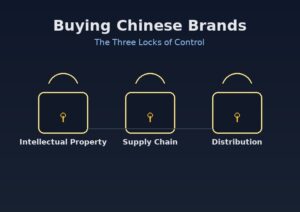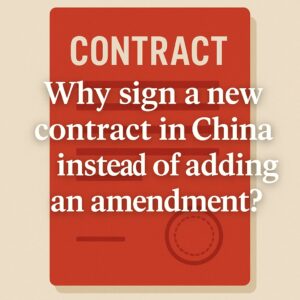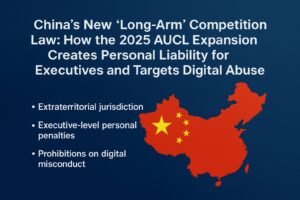In the past few months, our China lawyers have been seeing something new and troubling with China licensing agreements. Before I explain, let me step back and give a bit of history. This post is important so please stay with me.
In a typical China licensing deal the foreign licensor grants the Chinese licensee the right to produce and sell goods, use the licensor’s brand name or trademark, or use the licensor’s technology (patented or not). For years, been Chinese companies have increasingly been seeking to license technology from foreign companies and to get the rights to sell foreign products and services in China. We frequently tout licensing agreements as a way for companies to profit from China without having to “go into” China or spend a lot of money. See China Difficulties, Netflix, and Why We Love Licensing. All this is still true.
But….
Licensing agreements in the last five years
Our China licensing lawyers have drafted a ton of licensing agreements in the last five years or so (they were quite uncommon before then), and in nearly all instances those licensing deals have gone down as follows:
1. Chinese Company reaches out to Foreign Company about licensing XYZ from Foreign Company. Foreign Company comes to one of the China lawyers at my law firm for legal assistance and we explain some of the basic terms to which a licensor and licensee should agree before anyone bothers to spend time and money drafting a licensing agreement.
2. Maybe a third of the time the parties do not reach agreement on basic terms and no agreement is needed or drafted. The other two-thirds of the time, there is enough agreement on key terms between Foreign Company and Chinese Company and the Foreign Company istasked with drafting the licensing agreement. It usually makes sense for the licensor to draft a licensing agreement because the licensor typically needs more protection than the licensee. Among other things, the licensor needs to make sure it gets paid and its IP and reputation are protected. See China Licensing Term Sheets and China Technology and Trademark Licensing Agreements for more one what goes into China licensing agreements and what is usually important to foreign companies licensing anything to China.
3. One of our China lawyers then drafts the licensing agreement, and after a bit of back and forth negotiation, it gets signed.
Absurd licensing offers from sophisticated Chinese companies
But like I said, our China lawyers are starting to see something new and troubling. We are seeing what appear to be sophisticated Chinese companies (at least when it comes to licensing agreements) reaching out to relatively small unsophisticated foreign companies with what can only be described as absurd licensing offers. Here is how these “new” deals are to go down:
1. Chinese Company expresses interest in licensing Foreign Company’s IP and product to sell in China. The pitch is essentially as follows: we, a relatively big Chinese company will make and sell your consumer product in China at no cost or risk to you. We will pay you from our sales. You should license us to do all this so you can sell your products into China at no cost or risk to you.
2. This sort of offer is tempting for the foreign company because it sees this as a no-cost/no-risk way to get its product into China and to profit from doing so.
3. Chinese Company sends a long and fairly well-written English language licensing agreement to Foreign Company. Note how different this is from the old scenario where the foreign company (the licensor) would be the one to draft the licensing agreement.
4. This licensing agreement ridiculously favors Chinese Company. One such agreement would have given the Chinese company exclusive and perpetual worldwide rights to the licensor’s IP and product for just 10 percent of sales proceeds, no matter how the Chinese licensee company did with sales. In other words, once the agreement is signed, the foreign licensor no longer has any real rights left in its IP or its product and even if the Chinese company does not make a single sale (or even try to make a single sale), Foreign Company cannot terminate the contract. This agreement did allow for termination if the Chinese company goes bankrupt or ceases to exit, but even this did not really apply because the Chinese company would have been 100% free to assign its licensing rights to anyone else. This means, for example, you may think you are licensing your clothing designs to a clothing company as your Chinese licensee but the Chinese clothing company that signed your licensing agreement can assign that license to an arms dealer or a pornographer, neither of which would exactly be good for your clothing company’s long term reputation.
5. Other licensing agreements granted exclusivity “merely” for all of China (very broadly defined) but those proposed China licensing agreements contained much of the same over- the-top language as the one described above.
In two cases, the companies were coming to my law firm’s international IP lawyers on the recommendation of their regular lawyers who had made clear these agreements should not be signed. Some of the foreign companies knew the deal was terrible, but others did not know this until we pointed it out to them. In every instance, the foreign company wanted to do a deal with the potential Chinese licensee and tasked our lawyers with figuring out how to accomplish that. They all talked about wanting us to draft a “better agreement” as though that was all that separated them from a workable licensing agreement.
Our lawyers stressed their skepticism about the possibility of doing a real deal and told the clients there would be no point even in trying to draft a new licensing agreement without first getting some clear indication that the Chinese companies would sign such an agreement. We recommended the foreign companies go back to the Chinese companies and test them with a reasonable request. We suggested they ask the Chinese companies to agree to meeting some minimum amount of sales in the second or third year of the licensing deal. Not surprisingly, this was a no-go in every instance. The Chinese companies said this could not work because they had no idea what their sales were going to be. All of the foreign companies had the good sense to walk away and the Chinese companies presumably then moved on to looking for another potential sucker.
It may be fine to sell someone an exclusive lifetime license for real money up front in return, but unless your product or technology is and will always be a commercial flop, it should almost never make sense to sell an exclusive and permanent license with no guarantee of ever getting anything back in return.
A couple of these foreign companies mentioned that the Chinese companies would “at least try” to sell their products in China because why else would they have bothered with the contracts? Even this “at least try” assertion is not necessarily true because the goal of the Chinese company may be to remove potential competitors from China forever. This sort of thing happens ALL the time. and unless you conduct due diligence on the Chinese company you do not even know if it is legally allowed to sell the licensed products.
If you are presented with a wildly unfavorable licensing agreement you essentially have two choices. One, just walk away. Or two, go back to the Chinese company and ask if it is willing to make reasonable changes to its proposed agreement and then when it does not, just walk away. There is always a chance the Chinese company will accept the reasonable changes you propose, in which case you should probably still walk away rather than try to do business with someone who essentially just tried to scam you.
Is this really a scam though? A scam is usually defined as a dishonest scheme or fraud and, technically, there is no fraud at play here. The deals look legal and legitimate and they very well may be. They are though unbelievably terrible for the foreign party. Scam or no scam, these horrifically lopsided China licensing agreements highlight the complexity of cross-border licensing and the need for professional help before signing any international licensing contract.
You have been warned.
April 6, 2023 UPDATE: We are seeing even more of these ridiculously bad licensing agreements now than when we first wrote about them in 2018. There are just a ton of Chinese companies out there looking to take advantage of the increasing number of companies that do not want to take the risk of actually going into China, but still wish to profit from selling/distributing their products in China.

























